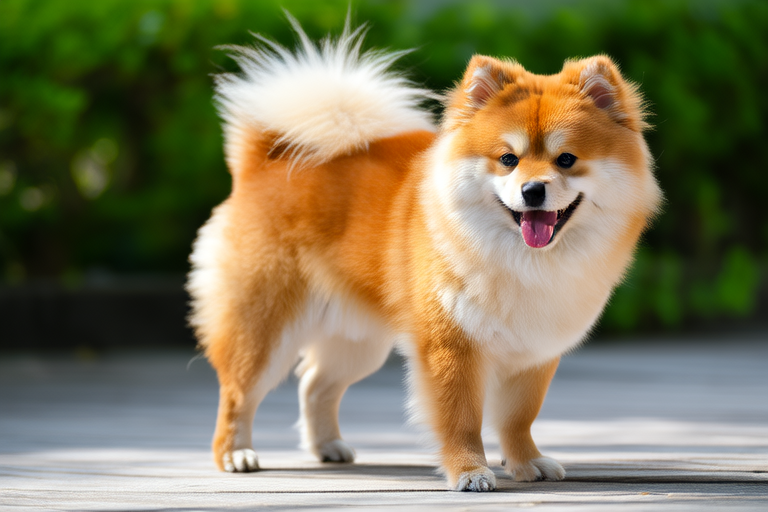Adorable, Intelligent, and Energetic: Why You Need a Pomeranian in Your Life
Welcome to the world of Pomeranians! These tiny, fluffy dogs have captured the hearts of many dog lovers for their adorable appearance, sharp intelligence, and high energy levels. If you’re considering adding a new furry friend to your family, a Pomeranian might just be the perfect choice. In this article, we will explore why these pint-sized companions are a delightful addition to any home.
The Unique Charm of Pomeranians
Pomeranians are known for their striking appearance. With their fluffy coats and expressive faces, they look like miniature foxes or teddy bears. Their double coat, which comes in a variety of colors such as orange, cream, black, and blue, adds to their unique charm. The Pomeranian’s small size, typically weighing between 3 to 7 pounds, makes them ideal for apartment living or for those who prefer a smaller companion.
One of the most appealing aspects of Pomeranians is their personality. They are often described as being brave, loyal, and alert. Despite their small size, they have a big presence and are not afraid to stand up for themselves. This can sometimes lead to confrontations with larger dogs, so it’s important to socialize them from a young age to ensure they get along well with others.
Intelligence and Training
Pomeranians are highly intelligent dogs that respond well to positive reinforcement training methods. They learn quickly and can be taught a wide range of commands and tricks. However, their intelligence can also make them stubborn at times, especially if they feel they’re not getting enough attention or rewards.
Training a Pomeranian requires patience and consistency. It’s essential to establish yourself as the pack leader early on to avoid any dominance issues later. Using treats, praise, and playtime as rewards can help motivate your Pomeranian during training sessions. Many owners find that clicker training is particularly effective with this breed, as it provides immediate feedback and reinforces good behavior.
Real-life anecdote: Sarah, a first-time dog owner, adopted a Pomeranian puppy named Charlie. Initially, Charlie was very headstrong and resistant to learning new commands. After attending a local obedience class and focusing on positive reinforcement techniques, Charlie quickly became one of the best-trained dogs in the group. Now, Charlie knows over 20 different commands and enjoys participating in agility classes with Sarah.
Energy Levels and Exercise Needs
Pomeranians may be small, but they have a lot of energy to burn. They require regular exercise to stay healthy and happy, although their needs are relatively modest compared to larger breeds. A daily walk or two, along with some indoor playtime, should suffice. However, due to their small size, it’s crucial to monitor their activity level to prevent joint strain or injury.
In addition to physical exercise, mental stimulation is equally important for Pomeranians. Puzzle toys, interactive games, and obedience training can help keep their minds engaged and prevent boredom-related behaviors such as chewing or barking.
Real-life anecdote: Mark, a single father, adopted a Pomeranian named Max to keep him company while working from home. Max quickly became his constant companion, following him from room to room and demanding attention throughout the day. To keep Max entertained, Mark set up a small obstacle course in their living room, which Max loved navigating. This not only provided physical exercise but also gave Max’s mind something to focus on.
Suitability as a Family Pet
Pomeranians are generally good with children, especially if introduced to them at a young age. However, their small size means they can easily be injured by rough handling, so it’s important to teach children how to interact gently with them. Pomeranians tend to be protective of their families, making them excellent watchdogs. They will alert you to any unusual sounds or movements, providing a sense of security for your household.
When it comes to other pets, Pomeranians can get along well with cats and other small animals if properly introduced. However, due to their strong prey drive, they may chase after smaller creatures. Early socialization is key to ensuring peaceful coexistence within a multi-pet household.
Care and Grooming
Grooming a Pomeranian requires regular maintenance to keep their coat in top condition. Brushing their fur at least twice a week helps prevent matting and removes loose hair. During shedding seasons, more frequent brushing may be necessary. Additionally, trimming their nails, cleaning their ears, and brushing their teeth regularly are essential for maintaining their overall health.
Pomeranians are prone to certain health issues, including dental problems, luxating patellas (dislocated kneecaps), and hypothyroidism. Regular veterinary check-ups and proper nutrition can help minimize these risks. Feeding them a balanced diet rich in protein, vitamins, and minerals is crucial for their well-being.
Real-life anecdote: Linda, a seasoned dog owner, has had several Pomeranians over the years. She learned the importance of proper grooming early on when her first Pomeranian, Bella, developed severe matting in her coat. Since then, Linda has made grooming a priority, ensuring her current Pomeranian, Lucy, stays comfortable and healthy.
Conclusion
Pomeranians are charming, intelligent, and energetic dogs that bring joy and companionship to countless households. Their small size, combined with their playful and loyal nature, makes them an excellent choice for families, singles, and seniors alike. While they do require some extra care and attention, the love and loyalty they offer more than make up for it.
If you’re considering adopting a Pomeranian, remember to do your research and prepare yourself for the commitment. With proper training, exercise, and care, you’ll have a wonderful companion by your side for many years to come. So why not give a Pomeranian a chance? You might just find yourself falling in love with this delightful breed.
